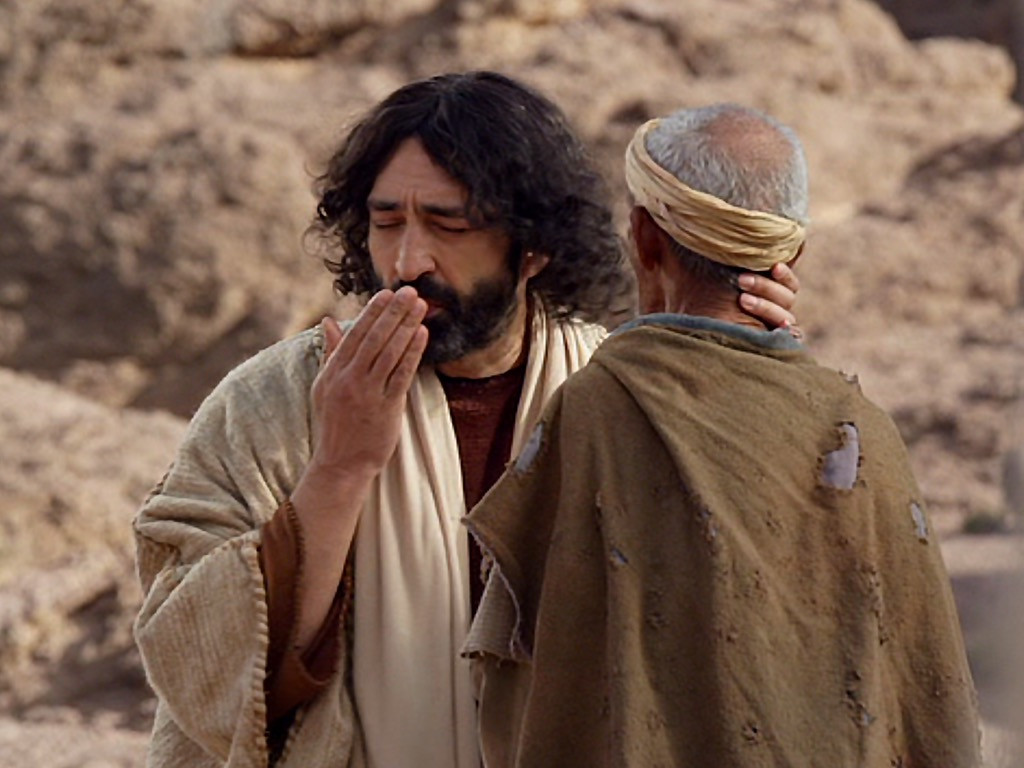Years ago my sister was very bold in witnessing about her faith in God. I remember thinking she was really out there – had crossed an invisible line – and it was not good. My other siblings and I criticized her for going too far. At the time, I was Catholic in name only, not practicing my faith and lacking any substantive relationship with God. Still, I admired her courage in sharing her faith when those around her rejected it, and her.
Today I am different. I have returned to the faith of my childhood and God has showered down graces in abundance. Several of my other sisters and I have crossed the invisible line and boldly share our faith. Reading the Beatitudes reminds me that those who speak freely about God will face rejection, just like my sister did. “Blessed are you when people hate you, and when they exclude and insult you, and denounce your name as evil on account of the Son of Man. Rejoice and leap for joy on that day!”
Rejection is not something we seek or desire naturally—quite the opposite. We want acceptance. We want to fit in. But Jesus tells us that we will be blessed in our rejection if it is caused by our relationship with Him. Rejection is a blessing in disguise. The world sees it as a curse, only capable of seeing it from a secular worldview. We Christians are called to adopt a supernatural worldview where troubles are blessings.
How can we see troubles as blessings? Here are four ways:
- By knowing that we are carrying out God’s will. If God calls me to speak a word of truth to a friend, I am blessed because God chose me to speak that particular word. He could have chosen anyone but He chose me. I am blessed.
- By realizing we are acting as Christ in the world. When I am rejected, they are rejecting Christ in me, which means they SEE Christ in me. That is a blessing. I must be doing something right.
- By uniting our suffering with Christ, who was also rejected. We are better able to relate to His rejection. Jesus chose to come in human form, to be rejected and murdered for our salvation. The love He showed for us is beyond imagining, so how can we not leap for joy when we are rejected like Him?
- By allowing our rejection to spur intercessory prayer. Surely my sister who boldly shared her faith all those years ago prayed often for me and the rest of the family. We needed an intercessor to offer prayers for our conversion of heart. And her prayers were effective. Her rejection became a blessing to us and to her.
I have joined my sister and crossed the line to boldly speak God’s truth in the world. Sometimes I am rejected. It saddens me because I want to share God’s love, but I remember the words of Jesus and know that my rejection is a blessing in disguise.
Hace años, mi hermana fue muy valiente al dar testimonio de su fe en Dios. Me acuerdo haber pensado que realmente estaba mal, que había cruzado una línea invisible, y que eso no era bueno. Mis otros hermanos y yo la criticamos por haber pasado la raya. En ese momento, yo era católica por nombre solamente, no practicaba mi fe y carecía de una relación sustancial con Dios. Aun así, admiraba su valor al compartir su fe cuando quienes la rodeaban la rechazaban tanto a ella como su fe.
Hoy soy diferente. He vuelto a la fe de mi infancia y Dios me ha colmado de gracias en abundancia. Varias de mis otras hermanas y yo hemos cruzado la línea invisible y compartimos nuestra fe con valentía. Leer las Bienaventuranzas me recuerda que quienes hablan libremente de Dios enfrentarán el rechazo, igual como a mi hermana. “Dichosos serán ustedes cuando los hombres los aborrezcan y los expulsen de entre ellos, y cuando los insulten y maldigan por causa del Hijo del hombre. Alégrense ese día y salten de gozo”.
El rechazo no es algo que busquemos o deseemos de manera natural, sino todo lo contrario. Queremos aceptación. Queremos encajar con el grupo. Pero Jesús nos dice que seremos bendecidos por ser rechazados si es a causa de nuestra relación con Él. El rechazo es una bendición inesperada. El mundo lo ve como una maldición, solo capaz de verlo desde un punto de vista profano. Nosotros los cristianos estamos llamados a adoptar un punto de vista sobrenatural donde los problemas son bendiciones.
¿Cómo podemos ver los problemas como bendiciones? A continuación hay cuatro formas:
- Al saber que estamos llevando a cabo la voluntad de Dios. Si Dios me llama a decir una verdad a un amigo, soy bendecido porque Dios me eligió para decir esa cosa en particular. Él podría haber elegido a cualquiera, pero me eligió a mí. Soy bendecido.
- Al darnos cuenta de que estamos actuando como Cristo en el mundo. Cuando soy rechazado, están rechazando a Cristo dentro de mí, lo que significa que VEN a Cristo en mí. Eso es una bendición. Seguro estoy haciendo algo bien.
- Al unir nuestro sufrimiento con Cristo, quien también fue rechazado, somos más capaces de relacionarnos con Su rechazo. Jesús eligió venir en forma humana, para ser rechazado y asesinado por nuestra salvación. El amor que nos mostró es inimaginable, así que ¿cómo podríamos no saltar de alegría cuando somos rechazados como Él?
- Al permitir que nuestro rechazo estimule la oración de intercesión. Seguramente mi hermana, que compartió con valentía su fe hace tantos años, rezó a menudo por mí y el resto de la familia. Necesitábamos un intercesor que ofreciera oraciones por nuestra conversión de corazón. Y sus oraciones fueron efectivas. Su rechazo se convirtió en una bendición para nosotros y para ella.
Me uní a mi hermana y crucé la línea para hablar con valentía la verdad de Dios en el mundo. A veces soy rechazada. Me entristece porque quiero compartir el amor de Dios, pero recuerdo las palabras de Jesús y sé que mi rechazo es una bendición inesperada.
 Colleen Orchanian is a podcaster, blogger, and spiritual director who desires to help others have a more profound encounter with God. She is the author of three books: Nearer My God to Thee, Times of Grace, and Lingering with God. Her podcast is Food for Thought (Spiritually Speaking). You can learn more at ColleenOrchanian.com.
Colleen Orchanian is a podcaster, blogger, and spiritual director who desires to help others have a more profound encounter with God. She is the author of three books: Nearer My God to Thee, Times of Grace, and Lingering with God. Her podcast is Food for Thought (Spiritually Speaking). You can learn more at ColleenOrchanian.com.
Feature Image Credit: Bartolomé Esteban Murillo, art.diocesan.com/stock-photo/ecce-homo-20691/
The views and opinions expressed in the Inspiration Daily blog are solely those of the original authors and contributors. These views and opinions do not necessarily represent those of Diocesan, the Diocesan staff, or other contributors to this blog.


 Kathryn Mulderink, MA, is married to Robert, Station Manager for Holy Family Radio. Together they have seven children (including Father Rob), and eleven grandchildren. She is President of the local community of Secular Discalced Carmelites and has published five books and many articles. Over the last 30 years, she has worked as a teacher, headmistress, catechist, Pastoral Associate, and DRE, and as a writer and voice talent for Catholic Radio. Currently, she serves the Church by writing and speaking, and by collaborating with various parishes and to lead others to encounter Christ and engage their faith. Her website is
Kathryn Mulderink, MA, is married to Robert, Station Manager for Holy Family Radio. Together they have seven children (including Father Rob), and eleven grandchildren. She is President of the local community of Secular Discalced Carmelites and has published five books and many articles. Over the last 30 years, she has worked as a teacher, headmistress, catechist, Pastoral Associate, and DRE, and as a writer and voice talent for Catholic Radio. Currently, she serves the Church by writing and speaking, and by collaborating with various parishes and to lead others to encounter Christ and engage their faith. Her website is 


 Lily, age 23, is a Michigan native and cradle Catholic who has spent most of her life exploring her own reasons to embrace her faith fully. She attended Franciscan University of Steubenville, where she discovered the beauty of her personal relationship with Christ and the Church. After college, she worked in Montessori Education for three years and recently transitioned to nannying. She is excitedly preparing for marriage in May 2025 and spends most of her time reading, wedding planning, and enjoying her dog and family!
Lily, age 23, is a Michigan native and cradle Catholic who has spent most of her life exploring her own reasons to embrace her faith fully. She attended Franciscan University of Steubenville, where she discovered the beauty of her personal relationship with Christ and the Church. After college, she worked in Montessori Education for three years and recently transitioned to nannying. She is excitedly preparing for marriage in May 2025 and spends most of her time reading, wedding planning, and enjoying her dog and family!


 Former NPS Park Ranger, Catholic educator, and Youth Minister, Melissa Lucca now spends her days evangelizing family and neighbors as a stay-at-home mom. She holds an MA in Theology from the Augustine Institute and pursues personal study in her spare time. Melissa loves Ignatian Spirituality, Mother Mary, and rock climbing. If you don’t hear her and her kiddo laughing at home, then they are probably out on an adventure!
Former NPS Park Ranger, Catholic educator, and Youth Minister, Melissa Lucca now spends her days evangelizing family and neighbors as a stay-at-home mom. She holds an MA in Theology from the Augustine Institute and pursues personal study in her spare time. Melissa loves Ignatian Spirituality, Mother Mary, and rock climbing. If you don’t hear her and her kiddo laughing at home, then they are probably out on an adventure!
 Christine Arata is a San Francisco, California native. She lives a few blocks away from the ocean and a park. She finds nature inspiring. Her cat brings her comfort. She loves being creative not only with her writing but with almost everything, including her home cooking. Her studies in the Catholic faith are ongoing. In 2019, when she discovered St. Hildegard of Bingen was underrepresented by Catholics, she found a purpose. Her latest website, St. Hildegard’s Wisdom features blog posts about all of that:
Christine Arata is a San Francisco, California native. She lives a few blocks away from the ocean and a park. She finds nature inspiring. Her cat brings her comfort. She loves being creative not only with her writing but with almost everything, including her home cooking. Her studies in the Catholic faith are ongoing. In 2019, when she discovered St. Hildegard of Bingen was underrepresented by Catholics, she found a purpose. Her latest website, St. Hildegard’s Wisdom features blog posts about all of that: 


 Allison Gingras (
Allison Gingras (
 Deanna G. Bartalini, M.Ed.; M.P.A., is a certified spiritual director, writer, speaker and content creator. The
Deanna G. Bartalini, M.Ed.; M.P.A., is a certified spiritual director, writer, speaker and content creator. The 